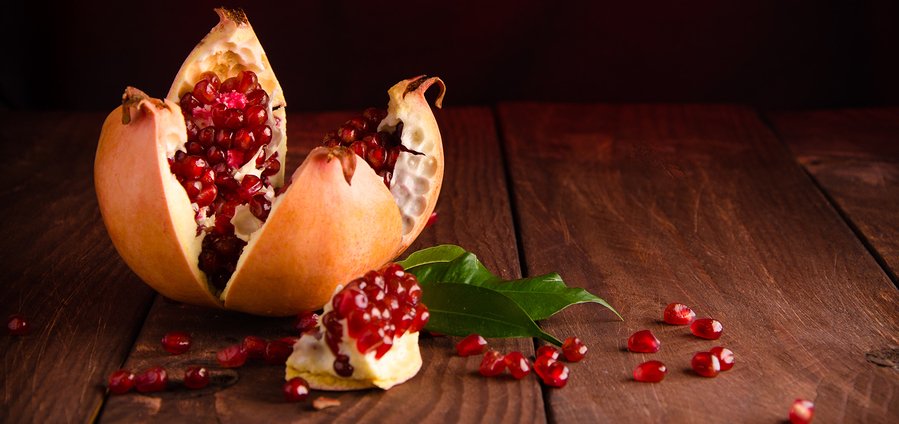If you live in the United States, it’s likely that pomegranates are not fruits you eat every day, but they should be. Chock full of beneficial nutrients, pomegranates are truly a superfood that you want to add to your regular diet. That’s why we are jumping on the bandwagon to celebrate Pomegranate Month in November and give you several good reasons to continue the celebration all throughout the year.
Pomegranates have a long and impressive history, mentioned in both Greek mythology and ancient Egyptian records. The Egyptians were even aware of pomegranate’s healthy properties and used it as a treatment for various infections. They were certainly on to something, since this fruit is full of antioxidants and anti-inflammatories as well as great flavor.
Here are five health benefits you can receive from eating pomegranates.
Cancer Protection
Rich in polyphenols, which are powerful micronutrients present in some plant-based foods that can destroy free radicals, pomegranates may have the ability to hinder the proliferation of cancer cells. In fact, a 2010 study at the Beckman Research Institute of the City of Hope in Duarte, California found 10 phytochemicals in pomegranates that seem to inhibit the growth of estrogen-responsive breast tumors.1 Adams, LS; et al. “Pomegranate ellagitannin-derived compounds exhibit antiproliferative and antiaromatase activity in breast cancer cells in vitro.” Cancer Prevention Research. January 2010. Accessed 16 October 2017. http://www.ncbi.nlm.nih.gov/pubmed/20051378.
Better Heart Health
Pomegranates can benefit your heart by potentially reducing the buildup of dangerous plaque in your arteries, which over time may block the flow of blood or form a clot that can result in a stroke or heart attack. A 2015 study out of the Technion-Israel Institute of Technology in Haifa, Israel suggested that pomegranate juice helps prevent atherosclerosis of the arteries.2 Rosenblat, Mira; et al. “Anti-atherogenic properties of date vs. pomegranate polyphenols: the benefits of the combination.” Food & Function. 12 March 2015. Accessed 16 October 2017. http://pubs.rsc.org/en/Content/ArticleLanding/2015/FO/C4FO00998C#!divAbstract.
Stronger Bones
You may be able to help protect your bones and stave off osteoporosis, which is common as we get older and is characterized by a loss of density that weakens and the bones. Research conducted in 2014 at the University of Auvergne in Clermont-Ferrand, France suggests that pomegranate extract and juice may lower oxidative stress and decrease inflammation to improve postmenopausal bone health.3 Spilmont, Melanie; et al. “Pomegranate and its derivatives can improve bone health through decreased inflammation and oxidative stress in an animal model of postmenopausal osteoporosis.” European Journal of Nutrition. August 2014. Accessed 17 October 2017. http://link.springer.com/article/10.1007%2Fs00394-013-0615-6.
Avoid Joint Problems
The antioxidants in pomegranates provide anti-inflammatory benefits, which is important for those with arthritis and other joint-related difficulties. Inflammation can cause soreness, stiffness, and swelling in the joints, and eventually lead to cartilage damage. Therefore, regular intake of pomegranates can offer a naturally healthy way to alleviate pain and other symptoms of arthritis related to this inflammation.
Improved Mental Acuity
Pomegranates are a good source of flavonoids, which are a type of phytonutrient with antioxidant properties that can help protect us at the cellular level from damaging free radicals. This may be the reason why this fruit is associated with a boost in brain power. A 2013 study at the University of California, Los Angeles showed that pomegranates appears to augment functional brain activity and improve memory.4 Bookheimer, Susan Y.; et al. “Pomegranate Juice Augments Memory and fMRI Activity in Middle-Aged and Older Adults with Mold Memory Complaints.” Evidence-Based Complementary and Alternative Medicine. May 2013. Accessed 18 October 2017. http://www.hindawi.com/journals/ecam/2013/946298/.
Since many Americans are not frequent eaters of pomegranates, we can look to our friends in the Mediterranean region, Middle East, and South Asia, where consumption is much higher. In the U.S., drinking pomegranate juice has become more popular but, as with all fruit, drinking juice typically means adding sugar to your diet as well as losing fiber. And pomegranates offer plentiful fiber at seven grams per cup.
To choose a good pomegranate, look for color. A darker or brighter red shade indicates ripeness and a sweeter tasting fruit. It should also be a little angled or flattened, not perfectly round in shape. Finally, consider the weight of the pomegranate. A ripe pomegranate will feel fairly heavy since it is packed with full seeds.
Now that you’re ready to eat your pomegranate, what do you do? Simply cut the fruit in half and start detaching the seeds, one section at a time. It shouldn’t take more than a few minutes. If you perform the seed removal with the pomegranate submerged in water, it will likely be less messy since you’re avoiding squirting juice.5 http://www.youtube.com/watch?v=-qfQ3_N7S6Y Or you use the technique that the real pros use.6 http://www.youtube.com/watch?v=2gyFM1Y8tqY Once you’ve gotten those seeds free, you can eat them as a snack on their own or add them to salads, as a topping for sweet potatoes, mixed into your oatmeal, or sprinkled over roasted vegetables.
References
| ↑1 | Adams, LS; et al. “Pomegranate ellagitannin-derived compounds exhibit antiproliferative and antiaromatase activity in breast cancer cells in vitro.” Cancer Prevention Research. January 2010. Accessed 16 October 2017. http://www.ncbi.nlm.nih.gov/pubmed/20051378. |
|---|---|
| ↑2 | Rosenblat, Mira; et al. “Anti-atherogenic properties of date vs. pomegranate polyphenols: the benefits of the combination.” Food & Function. 12 March 2015. Accessed 16 October 2017. http://pubs.rsc.org/en/Content/ArticleLanding/2015/FO/C4FO00998C#!divAbstract. |
| ↑3 | Spilmont, Melanie; et al. “Pomegranate and its derivatives can improve bone health through decreased inflammation and oxidative stress in an animal model of postmenopausal osteoporosis.” European Journal of Nutrition. August 2014. Accessed 17 October 2017. http://link.springer.com/article/10.1007%2Fs00394-013-0615-6. |
| ↑4 | Bookheimer, Susan Y.; et al. “Pomegranate Juice Augments Memory and fMRI Activity in Middle-Aged and Older Adults with Mold Memory Complaints.” Evidence-Based Complementary and Alternative Medicine. May 2013. Accessed 18 October 2017. http://www.hindawi.com/journals/ecam/2013/946298/. |
| ↑5 | http://www.youtube.com/watch?v=-qfQ3_N7S6Y |
| ↑6 | http://www.youtube.com/watch?v=2gyFM1Y8tqY |











